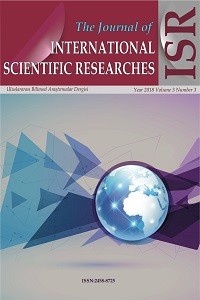Abstract
Jön Türklerin siyasi yaşamda etkin rol
oynadığı Osmanlı Devleti’nin son dönemlerinde, siyasi, sosyal ve kültürel
yaşamın temel unsurları, devleti içerisinde bulunduğu zor durumdan kurtarmak
amacı etrafında inkişaf etmiştir. Makalede politik duruş anlamında Jön Türkler
arasındaki benzerlik ve farklılıklar ifade edilirken; sosyal, ekonomik ve
politik anlamda ciddi bir çöküşün içerisinde bulunan imparatorluğun
kurtarılması için önerilen farklı görüşler ve etkisinde bulunulan ideolojik perspektifler
açıklanmaya çalışılmıştır. Batılılaşma veya çağdaşlaşma söz konusu hedef için
neredeyse tüm Jön Türkler için ortak hedef haline gelmiş fakat Batılı
devletlerin Osmanlı’ya dair politik hedefleri, dönem aydınları ve devlet
adamlarının da Batı’ya cephe almasına sebep olmuştur. Söz konusu arada
kalmışlık ile döneme ait pek çok eserde karşılaşılmaktadır. Ayrıca siyasi
anlamda Batı ile işbirliği yapılması gerektiğini düşünenler ile Batılı
değerlerin benimsenip, Batılı devletler ile Osmanlı’nın bekası için mücadele
edilmesi gerektiğini düşünen Jön Türkler arasında da bir ayrım söz konusu
olmuştur. Makalede bu ayrımlar irdelenmiş, Jön Türklerin önde gelen ve farklı
anlayışlara sahip üç ismi; Ahmet Rıza, Mizancı Murat Bey ve Prens Sabahattin’in
siyasi fikirleri ifade edilmeye çalışılmıştır.
Keywords
References
- Ahmad, F. (1985), İttihatçılıktan Kemalizme, İstanbul: Kaynak Yayınları, 10-13
- Akşin S. (2009). Türkiye Tarihi 3: Osmanlı Devleti 1600-1908. (Ed. Sina Akşin) İstanbul: Cem Yayınevi , 348-351, 359, 363
- Çavdar T, ( 2013), Türkiye’nin Demokrasi Tarihi. Ankara: İmge Yayınları, 64, 69
- Karabekir K, (2014), İttihat ve Terakki Cemiyeti. İstanbul: Yapı Kredi Yayınları, 16, 289, 298
- Karpat K, (1967), Türk Demokrasi Tarihi. İstanbul: İstanbul Matbaası, 18
- Mardin Ş, (1964), Jön Türklerin Siyasi Fikirleri. Ankara: Türkiye İş Bankası Kültür Yayınları, 4, 8, 17, 21-27, 45-55, 60-71, 83-85, 127-132, 142, 150-152, 222
- Petrosyan Y, (1974), Sovyet Gözüyle Jöntürkler. (Çev. M. Beyhan, A. Hacıhasanoğlu). İstanbul: Bilgi Yayınevi. 109, 189
- Ramsaur E, (2011), Jön Türkler: 1908 İhtilalinin Doğuşu. (Çev. M.Ö Mengüşoğlu). İstanbul: Pınar Yayınları, 42, 56, 59, 105, 106, 118, 119, 127
- Rıza A, ( 1988), Ahmed Rıza Bey’in Anıları. İstanbul: Arba Yayınları, 13-18
Abstract
In the recent periods of the Ottoman Empire, where Young Turks
played an active role in political life, the basic elements of political,
social and cultural life developed around the aim of rescuing the state from
its difficult situation. While the similarities and differences between the
Young Turks in terms of political stance are expressed; tried to explain the
different views and ideological perspectives that were suggested for the rescue
of the empire, which was in a serious collapse in social, economic and
political sense. Westernization or modernization has become a common goal for
almost all Young Turks, but the political aims of Western states for the
Ottomans have also led to periodic intellectuals and statesmen taking the front
line to the West. In other words, it is encountered in many works belonging to
the period of intermission and turnover. There is also a distinction between
those who think that cooperation with the West should be political, and those
who think that Western values should be adopted and the
Ottomans should be struggled with the Western states for the lasting of state.
These distinctions are examined, and Young Turk’s three leading names with
different understandings; Ahmet Riza, Mizancı Murat Bey and Prince Sabahattin's
political ideas were tried to be expressed.
Keywords
References
- Ahmad, F. (1985), İttihatçılıktan Kemalizme, İstanbul: Kaynak Yayınları, 10-13
- Akşin S. (2009). Türkiye Tarihi 3: Osmanlı Devleti 1600-1908. (Ed. Sina Akşin) İstanbul: Cem Yayınevi , 348-351, 359, 363
- Çavdar T, ( 2013), Türkiye’nin Demokrasi Tarihi. Ankara: İmge Yayınları, 64, 69
- Karabekir K, (2014), İttihat ve Terakki Cemiyeti. İstanbul: Yapı Kredi Yayınları, 16, 289, 298
- Karpat K, (1967), Türk Demokrasi Tarihi. İstanbul: İstanbul Matbaası, 18
- Mardin Ş, (1964), Jön Türklerin Siyasi Fikirleri. Ankara: Türkiye İş Bankası Kültür Yayınları, 4, 8, 17, 21-27, 45-55, 60-71, 83-85, 127-132, 142, 150-152, 222
- Petrosyan Y, (1974), Sovyet Gözüyle Jöntürkler. (Çev. M. Beyhan, A. Hacıhasanoğlu). İstanbul: Bilgi Yayınevi. 109, 189
- Ramsaur E, (2011), Jön Türkler: 1908 İhtilalinin Doğuşu. (Çev. M.Ö Mengüşoğlu). İstanbul: Pınar Yayınları, 42, 56, 59, 105, 106, 118, 119, 127
- Rıza A, ( 1988), Ahmed Rıza Bey’in Anıları. İstanbul: Arba Yayınları, 13-18
Details
| Primary Language | Turkish |
|---|---|
| Journal Section | Articles |
| Authors | |
| Publication Date | October 29, 2018 |
| Submission Date | May 29, 2018 |
| Published in Issue | Year 2018 Volume: 3 Issue: 3 |



